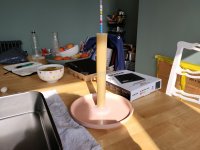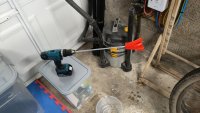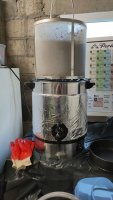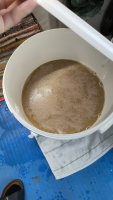BasementArtie
Well-Known Member
- Joined
- May 24, 2021
- Messages
- 169
- Reaction score
- 116
Long story short...we'll find out soon!
Last Saturday, I messed up a mash temp for my newest beer (Double NEIPA) and ending up mashing at 70-72C for 90 mins. I was trying to stir like crazy with my drill paddle (attached photo) to reduce the temp to no avail! So I thought **** it, I'll cover it and leave it over night (10hours). Came back and the temp was 62C and I carried on my brew day as planned. Pitched the yeast, lovely fluffy krausen. The OG was 1.081 and I've double dry hopped this bad boy one during fermentation and one after fermentation. I'm taking my first hydrometer sample this Wednesday, hopefully its down to 1.020ish as I wanted it to be 8% however I don't hold out much hope.
Last Saturday, I messed up a mash temp for my newest beer (Double NEIPA) and ending up mashing at 70-72C for 90 mins. I was trying to stir like crazy with my drill paddle (attached photo) to reduce the temp to no avail! So I thought **** it, I'll cover it and leave it over night (10hours). Came back and the temp was 62C and I carried on my brew day as planned. Pitched the yeast, lovely fluffy krausen. The OG was 1.081 and I've double dry hopped this bad boy one during fermentation and one after fermentation. I'm taking my first hydrometer sample this Wednesday, hopefully its down to 1.020ish as I wanted it to be 8% however I don't hold out much hope.
























































![Craft A Brew - Safale S-04 Dry Yeast - Fermentis - English Ale Dry Yeast - For English and American Ales and Hard Apple Ciders - Ingredients for Home Brewing - Beer Making Supplies - [1 Pack]](https://m.media-amazon.com/images/I/41fVGNh6JfL._SL500_.jpg)




